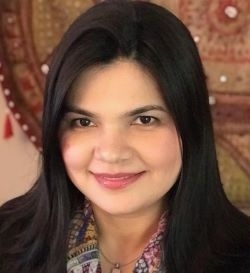
Erum Hadi, a second-year student in the Ph.D. World History program, has won the First Place Prize in International History at the 24th Annual Barnes Club Graduate Student History Conference for her presentation, “Designed by Diversity: The Syncretic Cultural History of Gujarati Textiles.” The conference, which was held from March 22-23 at Temple University’s Center City campus, provided a certificate and $100 cash prize to Erum along with the award.
Erum’s paper focused on the textile trade in the northwest Indian region of Gujarat. Her research interests include South Asian material culture in the early modern period, as well as the “complicated web of oceanic trade” through the Indian Ocean at the time. By studying the material construction and design elements of textiles from as far back as the fourth century B.C.E., Erum has determined that merchants in Gujarat were deeply engaged with global trade, and that cultural intersections happened frequently as part of the economic life of the period.
For example, a paisley motif on some of the textiles Erum has studied have an origin in Northern India and also appear contemporaneously on African clothing, indicated that the early modern period of history was globalized similarly to our current moment.
“We think of globalization as something new, but it’s not really that new,” she said. “It’s been happening for a long time.”
Erum became interested in studying material culture after taking a course taught by Associate Professor Tracey-Anne Cooper, Ph.D. “Dr. Cooper showed us how to use material artifacts to understand social and cultural aspects of life, as well as how cultures blend through hybridity.”
Erum is also a science research educator at the high school level, where she enjoys sharing her joy for research with students. Previously, she has held research scientist positions at local health departments and taught as an adjunct lecturer at CUNY Lehman College. Despite a background in the sciences, Erum has always had a passionate interest in world history and in studying the past through new perspectives. “I’ve been a researcher for my whole career,” she said. “The topics change, but the methods don’t. Research is research.”
In summer 2018, Erum participated in the Communities Connecting Heritage program at the Smithsonian Institution. The program is a virtual exchange between the Smithsonian’s Center for Folklife and Cultural Heritage and its West Bengali staff. For summer 2019, Erum has received a Nickolas Davatzes Scholarship and Research Grant to view textile archives at the London Museum in preparation for her dissertation.
“Erum's research shows us how analysis of objects and textiles is an illuminating way to understand how people in the past understood their identities and shaped their cultures,” said Associate Professor and Chair of History Nerina Rustomji, Ph.D. “Her dynamic research methods demonstrate the boundless possibilities of historical research.”
